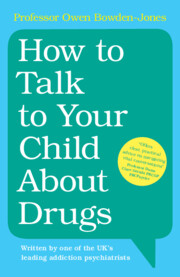Book contents
- How to Talk to Your Child About Drugs
- How to Talk to Your Child About Drugs
- Copyright page
- Contents
- Acknowledgements
- Introduction
- 1 What Are Psychoactive Drugs, Who Uses Them and Why?
- 2 Understanding Adolescence
- 3 Having the Drug Conversation with Your Child
- 4 Drugs and the Brain
- 5 How Do Drugs Cause Harm?
- 6 Types of Drugs
- 7 Rise of the Synthetics
- 8 Legal but Harmful: Prescription Medications, Tobacco, Vaping and Alcohol
- 9 Behavioural Addictions
- 10 Detecting Drug Use and What to Do about It
- 11 Treatment and Recovery
- 12 Final Thoughts
- Useful Resources
- References
- Index
4 - Drugs and the Brain
Published online by Cambridge University Press: 13 February 2025
- How to Talk to Your Child About Drugs
- How to Talk to Your Child About Drugs
- Copyright page
- Contents
- Acknowledgements
- Introduction
- 1 What Are Psychoactive Drugs, Who Uses Them and Why?
- 2 Understanding Adolescence
- 3 Having the Drug Conversation with Your Child
- 4 Drugs and the Brain
- 5 How Do Drugs Cause Harm?
- 6 Types of Drugs
- 7 Rise of the Synthetics
- 8 Legal but Harmful: Prescription Medications, Tobacco, Vaping and Alcohol
- 9 Behavioural Addictions
- 10 Detecting Drug Use and What to Do about It
- 11 Treatment and Recovery
- 12 Final Thoughts
- Useful Resources
- References
- Index
Summary
Information travels through the brain as electrical signals along a complex network of interconnecting nerve cells called neurons.
Neurons connect to each other at synapses, small gaps where chemicals called neurotransmitters amplify or muffle the electrical signals.
The reward pathway determines our experience of pleasure and many psychoactive drugs work by over-stimulating this pathway.
After using psychoactive drugs, the brain needs time to recover. This is often experienced as a psychological ‘crash’ or ‘come down’.
If a drug is used regularly, the desired effects become harder to achieve – a process called tolerance.
People who use drugs often increase the amount of drug they take over time in an attempt to overcome tolerance. This increases the risk of drug-related harm.
Regular psychoactive drug user ends up altering brain functioning, making it much harder to enjoy non-drug experiences. The world can become joyless.
- Type
- Chapter
- Information
- How to Talk to Your Child About Drugs , pp. 56 - 71Publisher: Cambridge University PressPrint publication year: 2025

